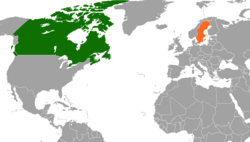Canada–Sweden relations
 | |
Canada |
Sweden |
|---|---|
Canada–Sweden relations refer to Interstate relations between Canada and the Kingdom of Sweden. As founding members of the Arctic Council, their relations are close, positive and constructive. Both countries have strong commitments to peacekeeping, UN reform, development assistance, environmental protection, sustainable development, and the promotion and protection of human rights.[1] In additional, there are more than 300,000 Canadians of Swedish descent.[2] Canada has an embassy in Stockholm and honorary consulates in Göteborg and Malmö. Sweden has an embassy in Ottawa and honorary consulates in Calgary, Edmonton, Fredericton, Halifax, Montreal, Quebec City, Regina, Toronto, Vancouver and Winnipeg.
History


Sweden became the first European country to join the Canadian-initiated International Model Forest Network in 2004. Sweden's active membership concerning two Model Forests located in Sweden has expanded ties between the Aboriginal peoples of Canada and the Sámi of Sweden.
The volume of trade between Canada and Sweden is small but growing. Canada's exports to Sweden (mainly ores, machinery and electrical machinery) totalled $544.7 million in 2007, while Canadian imports from Sweden totalled $2.1 billion in the same period. Key imports included machinery, pharmaceutical products, and vehicles.
In 2007, Canadian direct investment in Sweden approached $1.3 billion, while Swedish foreign direct investment (FDI) in Canada reached $8.5 billion. Sweden spends approximately 4% of its GDP on research and development, the highest level in the OECD, with research split between university-based and corporate research. Research in the corporate sector is mainly in transportation, telecommunications and pharmaceuticals; and is dominated by Ericsson. Opportunities for Canada-Sweden partnership in research include the areas of forestry; advanced materials; genomics and pharmaceuticals; information technology; and polar, environmental and atmospheric studies.[3]
See also
References

